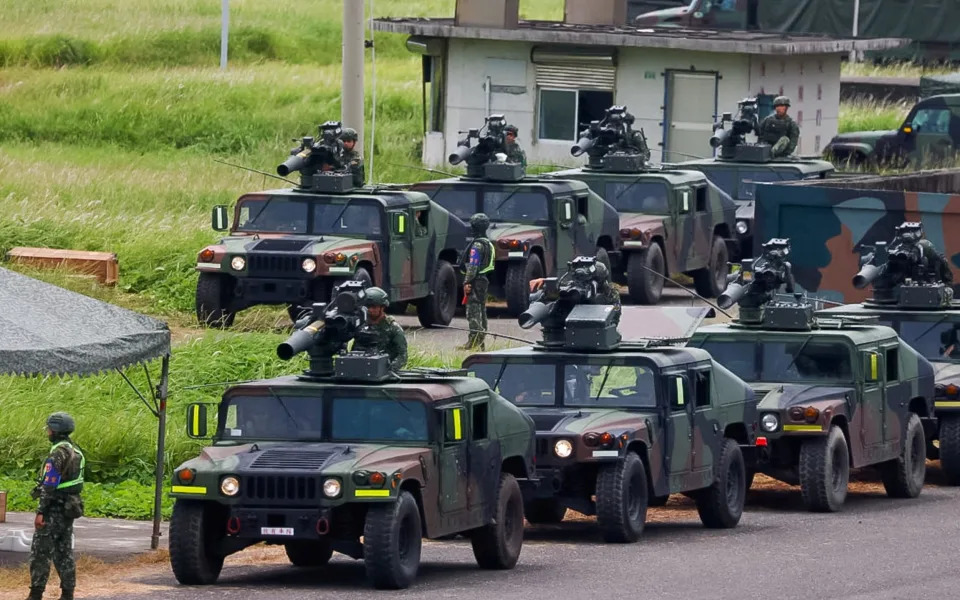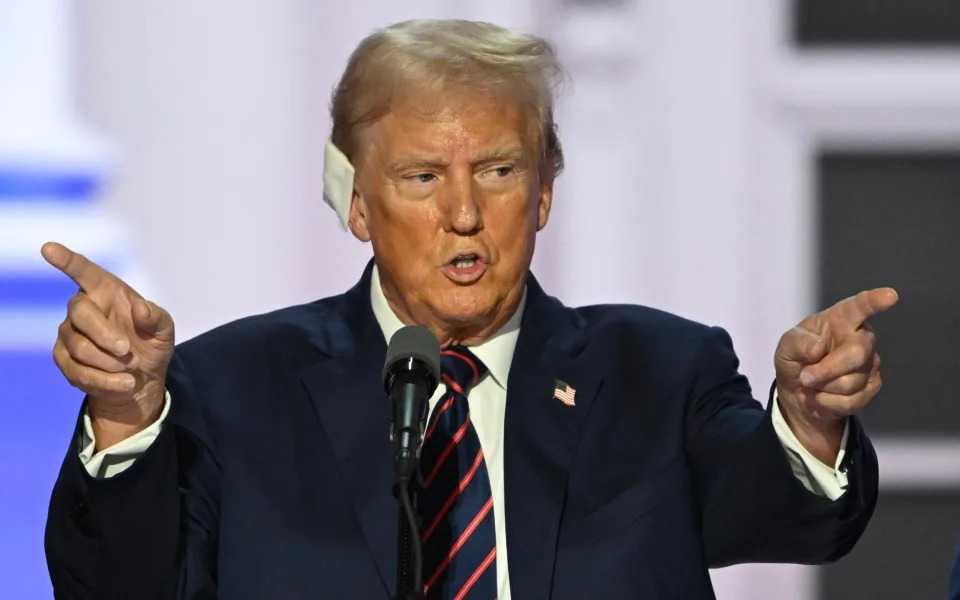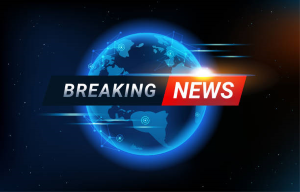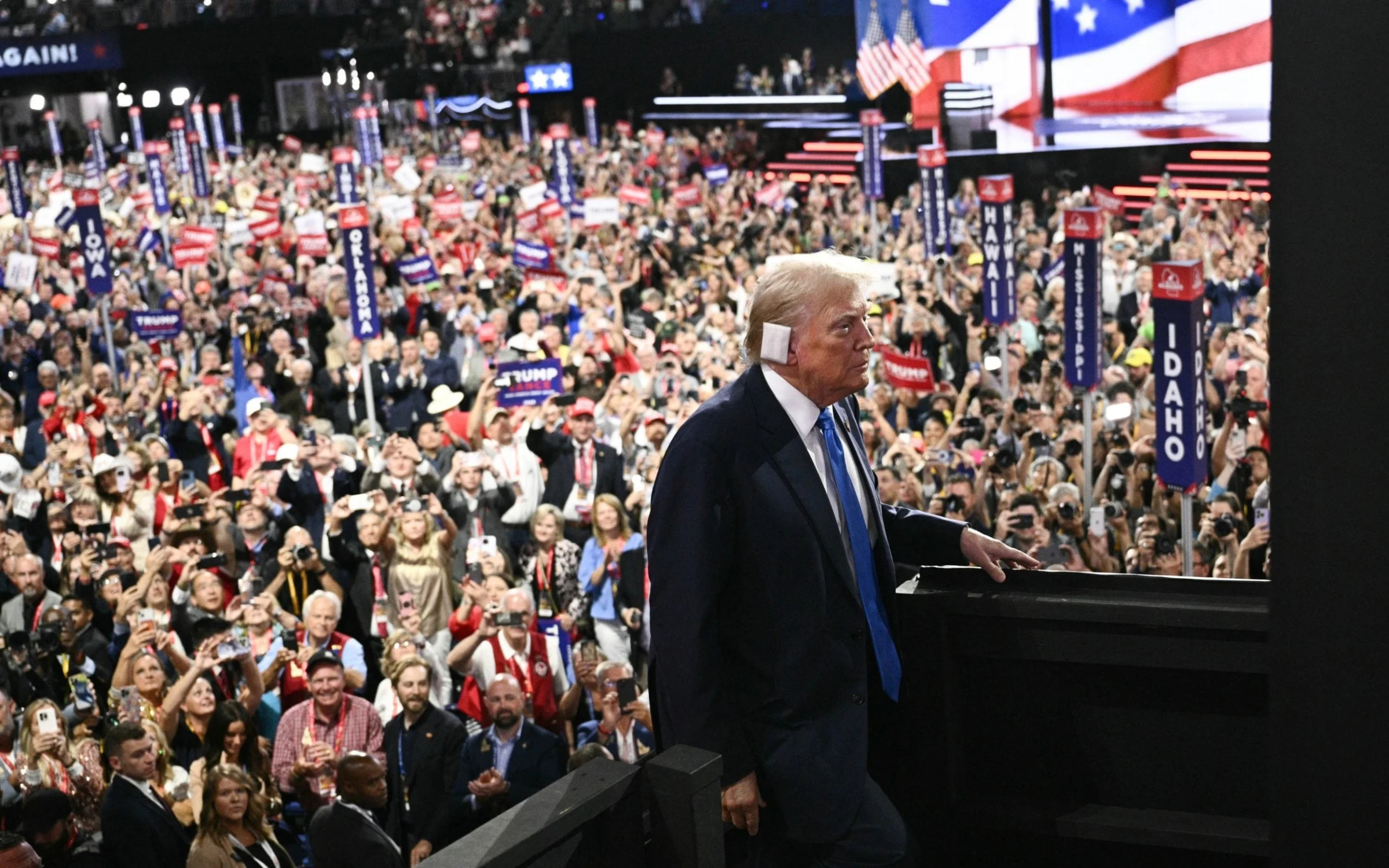Donald Trump has signalled the US would not defend Taiwan from a Chinese invasion under his presidency – because the country had grown rich by “stealing” US microchip production.
The Republican 2024 nominee said Taipei “should pay” Washington to support its defence, adding that the island nation was 9,500 miles away and “doesn’t give us anything”.
His remarks call into question whether US support for Taiwan would continue if he won a second term, as the polls suggest, in November’s presidential election.
Asked whether he would defend the island, which Beijing has vowed to annex, Trump declined to answer explicitly, telling Bloomberg: “I think Taiwan should pay us for defence.
“You know, we’re no different than an insurance company. Taiwan doesn’t give us anything.”
Trump also complained that the island “took all of our [semiconductor] chip business” and was “immensely wealthy”. “I mean, how stupid are we?” he added.
The self-governing island produces around 90 per cent of the world’s advanced semiconductor chips, which power everything from smartphones to AI applications. It is a major supplier to some of America’s biggest companies, including Apple and Nvidia.
Washington does not diplomatically recognise Taiwan, but it is a key partner and major weapons provider to the country, and Congress recently passed with bipartisan support a military aid package worth $8 billion (£6.15 billion) aimed at countering Beijing in the region.

The longstanding US policy towards the island is one of “strategic ambiguity”. However, Joe Biden has said on several occasions he would come to Taiwan’s aid in the event of an invasion.
Speaking to Bloomberg, Trump described Taiwan as “the apple of President Xi’s eye” and noted that it “is 9,500 miles away” from the US, while it is “68 miles away from China”.
The former president said China had been “very aggressive” since he left office in 2021 and he “wouldn’t feel so secure right now” if he was Taiwan.
Xi has ramped up unification rhetoric
Beijing has refused to rule out the use of force in bringing Taiwan under its control, while Xi Jinping has ramped up rhetoric about “unification” being “inevitable”.
In response to Trump’s comments, Cho Jung-tai, Taiwan’s premier, pointed out that Taipei had steadily boosted its defence budget in recent years.
“We are also clear that Taiwan-US relations have been very strong in recent years,” he said.
“Maintaining the peace and stability of the Taiwan Strait and Indo-Pacific region is our common responsibility and goal.”
Countering a rising China is a key aim of Republicans in Congress, even among isolationists who broadly share Trump’s America First approach.

Trump’s latest rhetoric around Taiwan appears contrary to that of his running mate, JD Vance.
The Ohio senator described Beijing as “the biggest threat to our country” in an interview this week and has said “we should make it as hard as possible for China to take Taiwan in the first place”.
Mr Vance was due to address the Republican national convention in Milwaukee on Wednesday night, his first introduction to voters on the national stage since being named the GOP vice-presidential candidate.
Former rival Haley booed as she endorses Trump
Earlier, former Trump rivals took to the podium and called for Republican unity – but received a mixed response.
Nikki Haley, Trump’s former UN ambassador, received some boos from the crowd when she appeared on stage.
Ms Haley, who dropped her challenge to Trump’s candidacy after losing every state but one in the early slate of contests, was a last-minute addition to the programme.
She began her speech by noting she had been invited to speak by Trump “in the name of unity”, and used the occasion to explicitly endorse Trump, something she has delayed doing for months.
She said: “You don’t have to agree with Trump 100 per cent of the time to vote for him. Take it from me. I haven’t always agreed with President Trump. But we agree more often than we disagree.”
Trump, who watched from a private box, sat unsmiling for most of her remarks, but let out a laugh when Ms Haley talked about their disagreements and applauded her calls for the party to come together.
On Thursday night, the 78-year-old will formally accept the GOP nomination with a keynote address.
He has reportedly altered his speech in the wake of the assassination attempt on him to focus the party on presenting a united front.
Other former Trump rivals, Ron DeSantis, the governor of Florida, and the entrepreneur Vivek Ramaswamy also enthusiastically backed him as the party nominee in their convention speeches.
I’m gonna be president, boasts Trump
The Trump campaign is increasingly optimistic of victory in November following Mr Biden’s disastrous debate performance and Democratic in-fighting over the 81-year-old’s electoral viability.
In his interview with Bloomberg, Trump boasted: “I’m doing well in the polls and I’m gonna be president.”
He brushed off suggestions that his criminal conviction in New York could be a concern for voters, saying he had taken in “hundreds of millions of dollars” since his guilty verdict.
Trump ruled out pardoning himself over the federal charges he faces if he returns to the presidency.
He also discussed his warm relations with Mohammed bin Salman, the Saudi Crown Prince, and revealed he is in occasional contact with him.
“It’s been a while, but I have a very good relationship [with him],” he said.
AfriPrime App link: FREE to download...
https://www.amazon.com/Africircle-AfriPrime/dp/B0D2M3F2JT
Trump says Taiwan should pay more for defense and dodges questions if he would defend the island
Former President Donald Trump demanded the self-governed island of Taiwan pay for U.S. protection, dodged the question of whether he would defend the island from Beijing's military action and accused the island of taking the computer chip industry away from the United States.
“Taiwan should pay us for defense,” the Republican presidential candidate said in an interview with Bloomberg Businessweek. “You know, we're no different than an insurance company."
Trump's remarks, made public Tuesday, add uncertainty to Trump's approach to Taiwan at a time his running mate, JD Vance, has called China the “biggest threat” to the United States. President Joe Biden has said he would send troops to defend the island.
In Taiwan, Premier Cho Jung-tai responded that Taiwan is “willing to take on more responsibility" and would defend itself.
In a statement, Taiwan's de-facto embassy in Washington said it is in the interest of the U.S. and the international community to preserve peace and stability in the Taiwan Strait because it is an indispensable part of global prosperity.
"As the threat of military coercion increases, Taiwan is doing its part by actively strengthening deterrence capabilities with the support of the United States under the Taiwan Relations Act,“ the Taipei Economic and Cultural Representative Office said.
As the rivalry between Washington and Beijing heats up, Taiwan — an island that broke away from mainland China in 1949 following a civil war — has become one of the thorniest issues in U.S.-China relations.
Beijing claims sovereignty over the island and vows to take it by force if necessary to achieve unification. Washington insists any differences be resolved peacefully and U.S. law obligates it to supply Taiwan with hardware and technology for self-defense. In the past several years, ties between Washington and Taipei have grown stronger, as Beijing ratchets up military and diplomatic pressure on the island.
Last month, the Biden administration approved a $360 million weapons sale to Taiwan, sending the island hundreds of armed drones, missile equipment and related support material. Taiwan pays for the military equipment.
Citing the arms sale and other unspecified U.S. moves to undermine Beijing's interests and trust between the two countries, China's foreign ministry announced Wednesday it was canceling talks with the U.S. on arms control and nonproliferation.
“The responsibility full lies with the U.S.,” said Lin Jian, a spokesman for the Chinese foreign ministry.
In the interview, Trump said he didn't feel “so secure” over the Taiwan Strait, where Beijing has “been very aggressive and got ships all over the place." He suggested that China could easily take over the island but has not done so because of Taiwan's prized semiconductor industry, which make the computer chips that power everything from smartphones to cars and satellites.
“That's the apple of President Xi's eye,” Trump said, referring to Chinese President Xi Jinping.
He suggested that Taiwan has a stranglehold on the computer chip industry over the U.S. and because of that, it has the means to pay.
“I mean, how stupid are we? They took all of our chip business. They’re immensely wealthy,” Trump said.
Rep. Michael McCaul, chair of the House Foreign Affairs Committee, called Taiwan “a perfect example of what we want all our allies to do," as demanded by Trump.
“They have consistently been one of the biggest buyers of U.S. weapons for its defense,” said McCaul, a Republican, who travelled to Taiwan last month to affirm the U.S. support for the island.
Rep. Raja Krishnamoorthi, a Democrat, accused the former president of betraying Taiwan.
“Former President Trump’s threat to abandon our nation’s longstanding, bipartisan commitments to Taiwan would mean betraying one of the world’s most vibrant democracies to the Chinese Communist Party," said Krishnamoorthi, ranking member of the House Select Committee on China.
“Failing to provide for Taiwan’s defense would not only be potentially illegal under the Taiwan Relations Act, it would be a betrayal of American values and our democratic institutions,” he added.
Trump “did not say the U.S. won't defend Taiwan,” said Miles Yu, who previously served in the Trump administration and is director of the China Center at the Hudson Institute, a Washington think tank. The former president said Taiwan should share more of the costs for such a collective defense, which is “far less of a problem” for Taiwan than for other U.S. allies in the region, he said.
“The defense of Taiwan is enshrined in the Taiwan Relations Act,” Yu said. “The joint defense of Taiwan is a national consensus. To change that will be extremely difficult.”
But, compared to Biden, Trump would place “utmost importance” on building credible deterrence over Taiwan, Yu said, adding Trump has said he would “bomb” Beijing if it should invade Taiwan.
AfriPrime App link: FREE to download...
https://www.amazon.com/Africircle-AfriPrime/dp/B0D2M3F2JT
Trump national security adviser calls on Taiwan to lift defense spending
New military recruits at training in Taichung.
A top national security adviser to Donald Trump said on Wednesday that Taiwan needs to boost its defense spending significantly in the face of potential Chinese aggression.
The comments by Robert O'Brien, Trump's fourth and final national security adviser, follow remarks by the former president in which he said Taiwan should pay the United States for its defense.
Speaking to Bloomberg Businessweek in a June 25 interview published on Tuesday, Trump said: "I know the people very well, respect them greatly. They did take about 100% of our chip business. I think Taiwan should pay us for defense."
O'Brien, asked about Trump's comment at a Bloomberg Roundtable on the sidelines of the Republican National Convention in Milwaukee, said he believed Trump meant to indicate Taiwan should contribute more to its own defense.
"They've got to ramp up their spending to contend with the PRC and CCP, and we can help them, we can be part of that. But I think what President Trump is saying is ... we've got to have burden sharing," O'Brien told reporters, referring to the People's Republic of China and the ruling Chinese Communist Party.
He suggested Taiwan should consider spending at least 5% of its gross domestic product on its military to keep up with China, though he implied that figure was a rough estimate.
While O'Brien is not part of the Trump campaign and made clear he was expressing his personal views, he is in frequent contact with the former president on national security matters.
Washington has been eager to create a military counterbalance to Chinese forces, building on an effort known within the Pentagon as "Fortress Taiwan", as Beijing's military makes increasingly aggressive moves in the region.
Taiwan typically purchases weapons it receives from the U.S. rather than relying on aid, though America and its allies do have significant military assets in the region, which are intended in part to deter Chinese aggression against the democratically governed island that Beijing claims as its territory.
“If you look at the support that we have provided, the security cooperation that we have provided them over decades, it has been Taiwan actually purchasing military (equipment) from the United States," State Department spokesperson Matthew Miller told reporters on Wednesday.
"It has not been any way charity from the United States."
Taiwan's de facto embassy in Washington said preserving peace and stability in the Taiwan Strait is in the interest of the U.S. and the international community.
"Taiwan is doing its part by actively strengthening deterrence capabilities with the support of the United States under the Taiwan Relations Act," it said in a statement, citing the "threat of military coercion."
The Biden campaign did not immediately respond to a request for comment.
INCREASED DEFENSE BUDGET
Taiwan has significantly expanded its defense budget in recent years. From 2017 to 2023 its military spending rose to 2.5% of GDP from 2%, according to the U.S. Congressional Research Service. Taipei announced a defense budget for 2024 of about $19.1 billion.
But the island's overall level of spending still pales in comparison to China's massive outlays and the historic build-up of the People's Liberation Army, which dwarfs Taiwan's forces. In March, Beijing unveiled an annual defense budget of some $230 billion, a 7.2% increase on the year before, though analysts say actual spending is likely much greater.
The Democratic ranking member of the U.S. House of Representatives' bipartisan select committee on China, Raja Krishnamoorthi, called Trump's comments a betrayal.
"Failing to provide for Taiwan's defense would not only be potentially illegal under the Taiwan Relations Act, it would be a betrayal of American values and our democratic institutions," he said in a statement.
During the Trump administration, Washington agreed to sell billions of dollars worth of U.S. weaponry to Taiwan, but Taipei has complained of delays to weapons deliveries, including of Stinger anti-aircraft missiles.
AfriPrime App link: FREE to download...
https://www.amazon.com/Africircle-AfriPrime/dp/B0D2M3F2JT
U.S. watching China’s actions on Taiwan, says McCaul
To combat China’s growing influence in the Pacific, and a possible invasion of Taiwan, House Foreign Affairs Committee Chairman Michael McCaul (R-Texas.) led a bipartisan delegation to Taiwan in May.
“China’s getting very aggressive. Very hostile,” McCaul said.
McCaul said Taiwan is vital to the world economy. According to the U.S. International Trade Commission, more than 90% of the world’s most advanced microchip manufacturing was located in Taiwan as of 2021.
“If China was to invade, that would shut down and create an economic crisis,” McCaul said.
Many lawmakers believe China is gearing up to be ready to invade Taiwan by the end of this decade, as early as 2027. They believe Chinese President Xi Jinping wants to create an “imperial China.”
Rep. Chrissy Houlahan (D-Penn.) was part of the bipartisan delegation to Taiwan. Houlahan said, while members of Congress were in Taiwan, the Chinese military encircled the island.
“That encircling can be interpreted as nothing other than provocation coming from PRC, because it looked every bit like a blockade,” Houlahan said.
McCaul said the U.S. military is watching China’s aggressive military actions toward Taiwan.
“They studied this very closely, in terms of what they would be doing in the event of an invasion of the island,” McCaul said.
The Pentagon pushed back on the notion of China preparing to invade Taiwan.
“Secretary Austin has said he does not believe that an invasion of Taiwan is imminent or inevitable,” said Maj. Gen. Patrick Ryder, the Pentagon Press Secretary.
Houlahan and McCaul said engaging with Taiwan and nations in the pacific will help fight the growing influence of China in the region.
AfriPrime App link: FREE to download...





